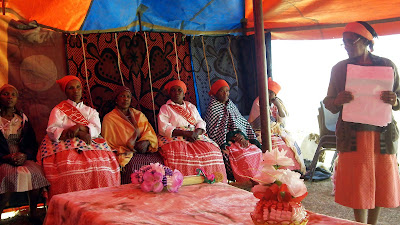There is a strong historical British influence on Basotho culture, hence English as one of the two official languages. One of the unexpected consequences of this historical link is that the Basotho play cricket. Cricket is a match about which I knew nothing other than the humorous references made to it by Douglas Addams. (I suspect I am not alone in that.)
As fate would have it, there is a large Indian population in Lesotho. Indians also play cricket. In fact, according to an Indian friend of ours here, star cricket players in India are treated much like rock stars in the United States. During the week leading up to India's Independence Day (August 15), there was a booth set up at the mall (there is only one mall in Lesotho) with information on India and cultural events going on around town. One of these events was a cricket match between an Indian team and a Basotho team.
As it turns out, the match was to be played at Machabeng College, which is only a few blocks from where we live. So, one sunny Sunday in August, my wife and I wandered over to Machabeng College to try to learn a little about cricket. Because it was still winter, the field was rather brown; however, it was not cold at all that day.
 Team Lesotho (I believe this is Lesotho's national team):
Team Lesotho (I believe this is Lesotho's national team): Team India (I understand this to be one of the teams comprised of local residents of Indian heritage):
Team India (I understand this to be one of the teams comprised of local residents of Indian heritage):
The match began with each team singing its national anthem:
Then, play commenced. Thankfully, our aforementioned friend was there to talk us through the basics of the match. Once we understood, or at least thought we understood, a little about the match, it was quite enjoyable to watch.

The crowd that day was small, and I suspect that Kathy and I were the only people there who were neither Basotho nor Indian. Nonetheless, what few spectators there were seemed quite enthusiastic. (As it turns out, we were told later that we were on the news.)
 Watching the young fans was yet another opportunity to see cultural traditions being passed on from one generation to the next - a particular type of experience I am coming to appreciate more and more.
Watching the young fans was yet another opportunity to see cultural traditions being passed on from one generation to the next - a particular type of experience I am coming to appreciate more and more.As much as we enjoyed watching, when we left we had been there for almost two hours and it was only half time. And this, we had been informed, was the short version of cricket. Next time - and I would like to go to another match - we will simply pack a picnic basket and make a day of it.
Now, I have been thinking about this. Here, we have a sporting event that lasts all day, provides ample opportunity for fans to camp out, eat and drink in excess, and spend an entire day watching activities that those who are not fans: 1) cannot even begin to understand; and 2) find so uninteresting that they immediately assume that those who do enjoy it are also uninteresting. To me, this seems like the British Empire's answer to NASCAR...



































